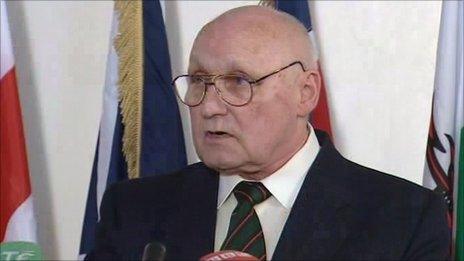Remembering the loyalist ceasefire 20 years on
- Published
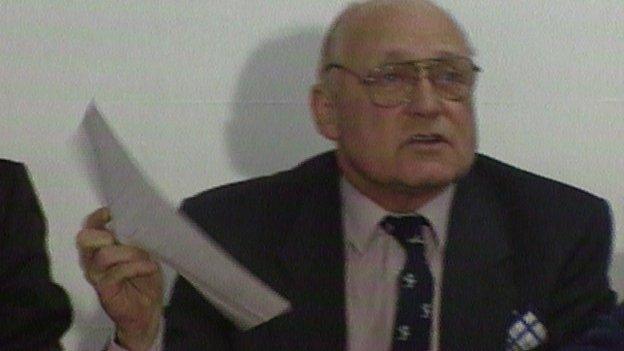
At a press conference on 13 October 1994, Gusty Spence announced the loyalist ceasefire
Six weeks after the IRA announced that it was ordering a complete cessation of all military activities, the loyalist paramilitary groups declared a ceasefire.
The identity of the person who made the statement on behalf of the Combined Loyalist Military Command was as important as the words he read.
Gusty Spence was a founding member of the UVF and an iconic figure for loyalists.
At a packed press conference on 13 October 1994, he declared that loyalists would end their violence at midnight.
He then offered "true and abject remorse" to the families of all innocent victims of the troubles.
Billy Hutchinson was at the back of the room, avoiding the cameras, as the statement was read, but he had played a key role in persuading the UVF to support the ceasefire.
Now the leader of the Progressive Unionist Party, viewed as the political representatives of the UVF, he insisted that the loyalist groups were not dancing to the IRA's tune.
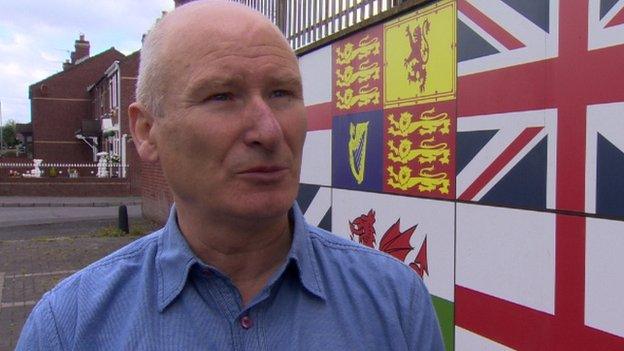
Billy Hutchinson said that the loyalist ceasefire was not a response to the IRA's ceasefire six weeks before
"The UVF was discussing the possibility of a ceasefire from the 1980s," he said.
'Brought together'
"There has always been an argument that loyalists reacted to the IRA, the loyalists didn't react to the IRA at that particular time.
"Loyalists had already decided they were going to call a ceasefire, it was a question of when.
"The difficulty for loyalists at the time was that it wasn't one homogeneous group, there were a number of groups that had to be brought together.
"There were internal arguments about whether there should be ceasefires or not, but people actually thought there should be."
Not all loyalists agreed at the time.
One of them was current UDA leader Jackie McDonald.
He outlined his opposition last month, when he spoke after a parade to mark the opening of a UDA memorial garden in south Belfast.
It took place on the 20th anniversary of the IRA killings of senior UDA members Joe Bratty and Raymond Elder in south Belfast.
They were shot just weeks after another senior UDA member Ray Smallwoods was killed in Lisburn, and just weeks before the IRA announced its ceasefire
Jackie McDonald told the crowd he believed the IRA was settling old scores before ending its violence, and that the UDA should have retaliated before any loyalist ceasefire was declared.
Hindsight
"I disagreed with it," he said.
"The reason I disagreed was because the IRA was given time to tie up the loose ends. I said Joe, Raymie, Ray Smallwoods have yet to be avenged. I don't agreed with it."
With hindsight, he said the ceasefire declaration was the right move.
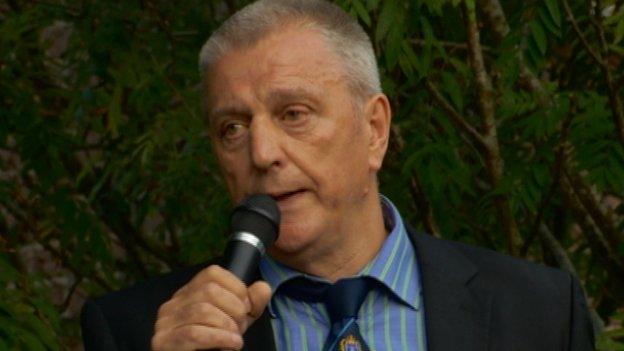
UDA leader Jackie McDonald said that he did not agree with the ceasefire when it was called
"Because of the ceasefires and the work that has gone on since, how many lives have been saved? That is something we have to consider."
The 1994 IRA ceasefire collapsed 18 months later, when a huge bomb devastated Canary Wharf in the Docklands area of London.
A new permanent ceasefire was declared in July 1997.
The Provisional IRA has decommissioned its weapons, its structures have been dismantled, and republicans say it will never re-emerge.
Twenty years after declaring an end to their violence, the loyalist paramilitary groups have also decommissioned, but they remain intact.
- Published27 August 2014
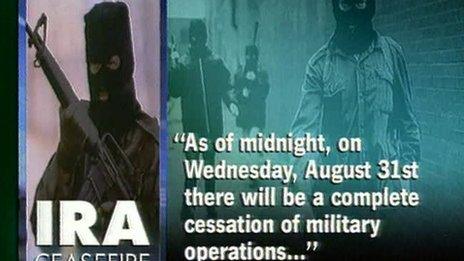
- Published25 September 2011
